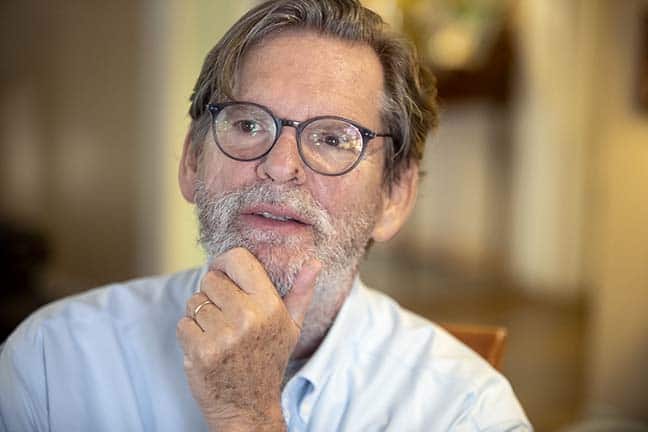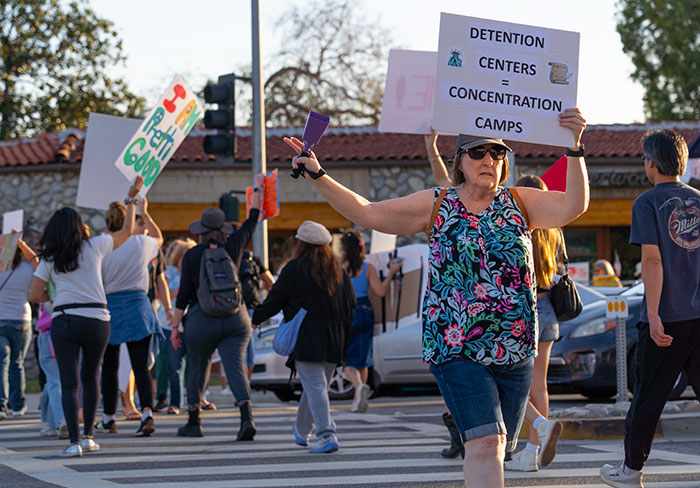2022 CUSD Board candidate profiles: Richard O’Neill

School board candidate Richard O’Neill
by Mick Rhodes | editor@claremont-courier.com
Richard O’Neill has the lucky fortune of being assured of winning his race to represent Trustee Area 3 on Claremont Unified School District’s Board of Directors, as the 71-year-old CUSD veteran of nearly three decades is running unopposed.
Though he will be new to the board when he takes office December 15, he’s certainly no stranger to CUSD. His family’s connection to the district — perhaps not surprisingly after spending nearly three decades teaching at CHS and sending each of his four grown children through Claremont schools — is profound.
“We have a deep intuition about this place and our love of it,” O’Neill said.
His wife Merrilyn also helped create murals at many elementary schools, including Vista del Valle and Sycamore.
“We have a close, visceral connection to this place, and all the admiration in the world,” he said.
So, with all that solidified and longstanding and with his retirement last June after 27 years at CHS, why put your neck on the block and jump into district politics?
“When I walked out of the classroom last year on June 16th, I suddenly realized there’s so much work yet to be done. It’s phenomenal,” he said. “Over the 27 years I taught you go through a lot of changes, a lot of evolution. There’s just work to be done with young people, with staff. Having this knowledge, I really couldn’t walk away.”
O’Neill was born and raised in Ohio, where he lived until he was 7. His family then moved to Atlanta for five pivotal years during Rev. Martin Luther King Jr.’s ascension to the national stage. It’s where a young O’Neill first became politically active, working against segregation in the South. Later he lived in Connecticut, where he attended Jesuit prep school, Rochester, New York, and finally, Los Angeles.
He earned his teaching credential from the University of La Verne, a bachelor’s degree from Immaculate Heart College, and master’s degrees from Claremont Graduate University and UCLA. He met his future wife when they were both undergraduate students at Immaculate Heart College (now Immaculate Heart High School) in Los Angeles. Married in 1974, they’ve lived in Claremont since 1979.
He started out teaching math at CHS, then English, and later “the theory of knowledge,” the core course for the school’s International Baccalaureate program.
“It was very rewarding,” O’Neill said of his IB classes. “It changed my thinking amazingly. I became totally fundamentally skeptical. Knowledge really requires a lot of discipline and a lot of patience and humility.”
Over the years he also taught personal finance, accounting, and film studies.
O’Neill’s top priority for his term is somewhat surprising.
“Given the evolution of political culture, we need to talk to people,” he said. “We’re in this ‘drive-by’ situation the school board’s classic for, where you have two minutes to make a comment, and then people typically get frustrated, and it’s just the way it has to be.”
O’Neill aims to work toward less of a “sound bite” experience for people who want to be part of school board business. He recalled a pivotal assignment during his teaching career, when he asked his English students to write their biographies.
“And their stories popped,” he said. “It’s very clear to me that if we’re really going to create a diverse society, which is a bottom line transcendently important goal, we have to listen to people. And that’s such hard work, and I don’t even know how to do it, given the vastness of it. So I’m going to have to figure that out as I go.”
Some of his other priorities are modest.
“Number one, because it’s a trustee job, not to screw up,” O’Neill said with a grin. “That means to maintain things, to keep those things that are working well, working.”
O’Neill cited the district’s staff, management, and human resources department as among its standout elements. Areas that need improvement, he said, include working more closely with struggling students, especially those who need help with math.
“In my opinion, you can’t do STEM [science, technology, engineering, math] without math.”
He recalled an impactful conversation with a colleague from 20 years ago.
“He talked about how fourth grade is so critical,” O’Neill said. “That’s when the wheels come off and kids get alienated, and not just in math.”
O’Neill would like to see the district allot more resources to help those struggling kids learn the foundations of math.
“Because math is aggressively cumulative; if something falls out …” he said, raising his hands to indicate frustration. “So, to the extent that I can be part of that, that’s really important to me.”
Some accused the CUSD Board of a lack of transparency surrounding the firing of former CUSD Superintendent Jeff Wilson and rehiring of his predecessor Jim Elsasser back in April. O’Neill was asked his take on the flap.
“For a functioning democracy, transparency is essential; these are taxpayers and we’re spending their money,” he said. “That’s just cards on the table.”
But, O’Neill said, he also knows most all personnel matters are protected as private, an arrangement that both protects individuals’ rights to privacy and helps to minimize CUSD’s exposure to litigation.
So, was the criticism warranted?
“From what I’ve heard — people I trust sharing things with me — it was not the best way of doing things,” he said. “But then again, I don’t know the detail. Some way or another Dr. Wilson had transgressed. I think that was obvious. Whether he was conscious of that or oblivious is a whole other thing.
“I don’t know how the board could have been more transparent. I just don’t see how. These are personnel issues, and they are locked down.”
Going forward, could there be a version of the board that would appease those critics who advocate for a more open and transparent body?
“I don’t know,” he said. “Because the fear of the liability and lawsuits and acrimony … everybody looks bad. And because you’re a trustee your job is not to mess things up. So, I don’t know how to deliver transparency. But, I am not afraid of talking about anything. I will put out what I think my constraints are, but I’ll talk to let people understand they’ve been listened to and heard. But I can’t go against the very rational policy of protecting the organization. We’re trustees.”
O’Neill, at 71, confounds the stereotype of an aging retiree set in his ways, unwilling to do the work to keep apprised of new thinking in technology, politics, and culture. He spoke at length about the need to adapt and anticipate what’s to come with respect to education.
“There are definite issues coming down: mental health, among both staff and students, what has Covid done?; all the knowledge gaps that can’t be measured; the persistence of online education; the shifting role of classroom teachers, where we’re no longer just shoveling information like coal into a furnace; that we more and more need to be accessible human beings and adult role models,” he said.
“So that’s a big change; and the final thing is technology. It’s really happening. And I just don’t mean iPads, although the textbooks in the library now are gathering dust, because they do a very efficient job. But it gives rise to online learning — and I know this from my experience in the tech world — artificial intelligence is coming down the pike; A.I. cuts costs, and the cost pressure on school districts is huge. But who wants to surrender that human component to Google, which has billions of dollars to spend? Who wants to surrender that to Meta?
“So, I do think the metaverse is coming down the pike, and I think we have to look out a decade more to think about it. And that’s why, like Walt Disney used imagination, we need to imagine things. We have to say, ‘What’s it going to look like in five years, in 10 years? What kind of stories, processes and notions?’ Because that gives people a chance to think and talk about things. If it’s part of a dialogue, we can think down the pike rather than just taking things in. You want to be proactive.”








0 Comments